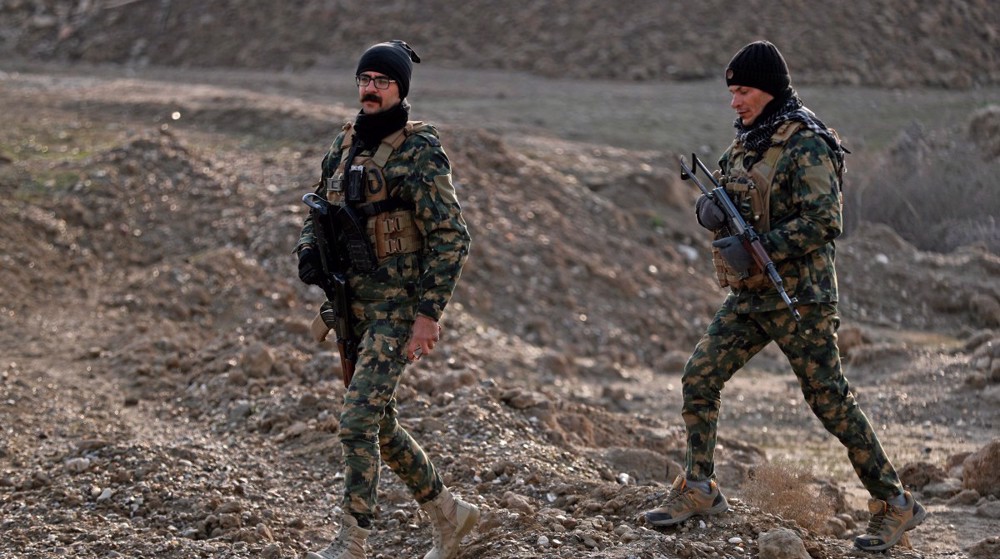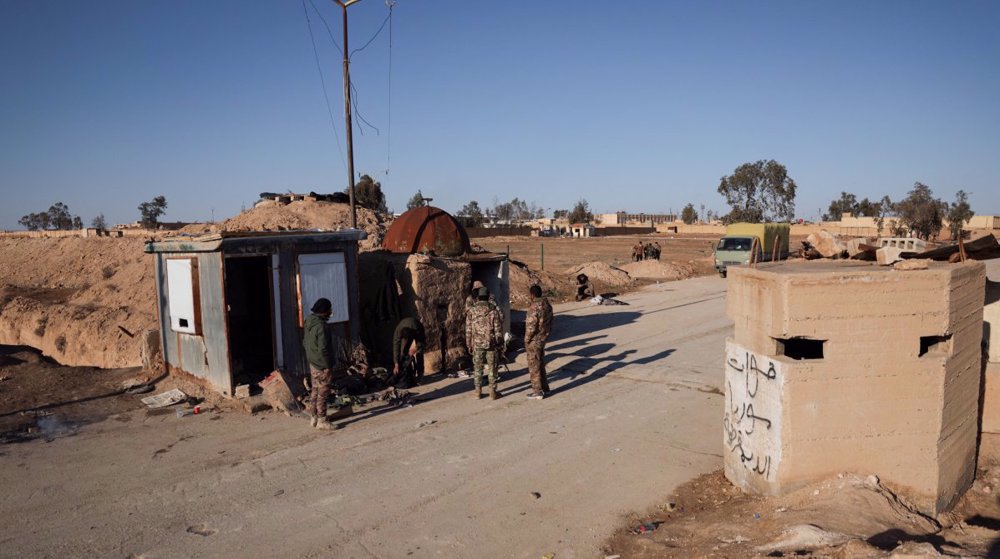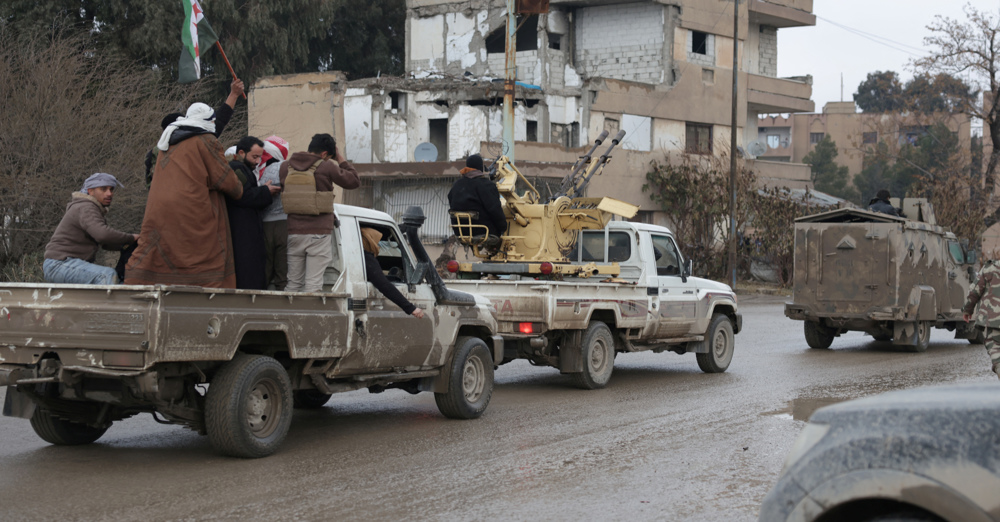Syria's Assad vows to continue anti-terror operations in eastern Ghouta
Syrian President Bashar al-Assad has vowed to continue operations in eastern Ghouta, stressing that they are part of the country's battle against terrorism.
"We will continue fighting terrorism ... and the Ghouta operation is a continuation of fighting terrorism," said Assad during a Sunday broadcast on state television.
"There is no contradiction between a truce and combat operations. The progress achieved yesterday and the day before in Ghouta by the Syrian Arab Army was made during this truce," he added.
The Syrian president was referring to a Russian-proposed daily humanitarian ceasefire from 9 am to 2 pm local time.
"Therefore we must continue with the operation in parallel with opening the way for civilians to leave," he added.
He further went on to dismiss Western claims concerning the humanitarian situation in eastern Ghouta as ridiculous false accusations. "The humanitarian situation which the West speaks of from time to time, is a very ridiculous lie, as ridiculous as the western officials who repeat it."
Eastern Ghouta, a besieged area on the outskirts of Damascus that is home to some 400,000 people, has witnessed deadly violence over the past few weeks, with Takfiri terrorists launching mortar attacks on the Syrian capital in the face of an imminent humiliating defeat.
“We have not started from Ghouta; we have started since the first day in combating terrorism in every place, we have started in Aleppo, Homs, Dayr al-Zawr; the operation in Ghouta is a continuation of combating terrorism in different places,” Assad added.
The Syrian president also condemned accusations by the West over Damascus using chemical weapons, adding that such claims were only an excuse to attack the Syrian army.
"Most western officials spoke about the use of chemical weapons only to come back after some days to say we have no proof. So they are damaging their credibility, and casting doubt over these allegations, with their own words," he stressed. “In addition, we abandoned the chemical weapon in 2013 and there is an organization concerned in inquiring this issue, and if there was any evidence, it would announce this thing, so I repeat, it is a mere blackmail which is used as a pretext to direct strikes against the Syrian army."
Syria signed the Chemical Weapons Convention (CWC) in 2013 and surrendered its stockpiles of chemical weapons months later to a joint mission led by the UN and the Organization for the Prohibition of Chemical Weapons (OPCW), which oversaw the destruction of the weaponry.
Western governments and their allies, however, have never stopped pointing the finger at Damascus whenever an apparent chemical attack takes place.
Referring to the US-led coalition's continued airstrikes on civilian positions, Assad noted that coalition is simply Daesh’s air force.
Read More:
- US-led coalition warplanes pound northeastern Syria, kill scores of civilians
- US-led coalition warplanes kill at least 24 in Syria's Dayr al-Zawr
- US airstrikes kill at least 29 civilians, injure many more in Syria's Dayr al-Zawr
Syria has been gripped by foreign-backed militancy since March 2011. The Syrian government says the Israeli regime and its Western and regional allies are aiding Takfiri terrorist groups that are wreaking havoc in the country.
Earlier in the day, Syrian government forces secured a humanitarian corridor for civilians to leave the militant-held enclave of eastern Ghouta.
According Syria’s official news agency, SANA, army troopers are protecting the safe corridor set up for the evacuation of civilians via al-Wafideen checkpoint, stressing that preparations were underway to deliver food aid to civilians trapped in eastern Ghouta.
Meanwhile, the Russian military has announced that militants based in eastern Ghouta have imposed a curfew during humanitarian pauses to prevent civilians from leaving the enclave.
The militants have also banned mass gatherings of civilians, Interfax quoted Russian Major-General Vladimir Zolotukhin as saying on Sunday.
Russia has designated four safe passage routes in Eastern Ghouta after a ceasefire was declared across Syria by the United Nations Security Council.
Assad meets high-ranking Iranian delegation
Also on Sunday, Assad met with the Iranian Foreign Minister's Special Assistant for Political Affairs Hossein Jaberi Ansari and his accompanying delegation in Damascus.

According to SANA, during the meeting, Assad highlighted the importance of prior and permanent coordination between Syria and friendly countries on various subjects.
He further stressed that the Syrian people must be the final decision-makers in any future political options in their country.
He also stressed the need to develop a common ground and a clear understanding of the most important outcomes of Sochi Congress.
"We meet with Iranian and Russian delegations in order to tackle the current situation, at the same time, in order to continue the outcomes of Sochi congress and during the coming days, there will be a Russian, Iranian and Turkish tripartite meeting to discuss the situation in Syria,” said Assad.
VIDEO | 18th Olympiad of Persian Language and Literature held in Moscow
VIDEO | Dozens killed after blast hits Shia mosque in Islamabad
Trump signs tariff threat against Iran’s trade partners shortly after high-stakes talks in Oman
VIDEO | Dire consequences ahead: Iran's warning to enemies on escalation
VIDEO | Huge turnout in Sana’a as masses protest Gaza violations, regional escalation
Showcasing missile with ‘extraordinary destructive power’ sign of refusal to renounce defense: IRGC
US imposes ‘terrorist-grade sanctions’ on UN expert, ICC judges amid Gaza accountability drive
VIDEO | Press TV's news headlines
















 This makes it easy to access the Press TV website
This makes it easy to access the Press TV website